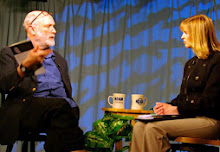Sunday, October 12, 2014
Trying To Help The Elephant Man Dance By Tim Suermondt
Trying To Help The Elephant Man Dance
By Tim Suermondt
The Backwaters Press
Omaha, Nebraska
www.thebackwaterspress.homestead.com
ISBN: 0-9785782-9-5
100 Pages
$16.00y
Review by Dennis Daly
Some people dance through life changing everything and everybody they touch for the better. They imagine goodness and a wonder-filled life that might someday be; then they try to make it happen. Unfortunately, very few poets count themselves among this happy hopeful group; most versifiers seem to prefer the harrowing reality of the coffin lid. Tim Suermondt differs greatly from those other poets—the morose ones, that is—and, besides, he sings, mimics Cary Grant and understands the religious experience of a well-made grilled cheese sandwich.
Opening his collection with a poem entitled The Days of the Dead Are Alive with Happiness Suermondt treats his readers to a rather funereal square dance. Skeletons clanking about with energy put on quite a show for Everyman who, relishing his favorite bologna and cheese sandwich, gives a nod and wink to his future state of being. The poet sets up his piece this way,
You can’t see them
although the faint but energetic crackle
gives them away, those skeletons
in their true freedom and democracy
who are plying their square dance
throughout the apartment complex,
changing partners with ghostly speed, adding
to “ashes to ashes, dust to dust”
the crucial amendment: “Bone to Bone.”
In a multileveled poem, Flying Without the Geese or the Plane, Suermondt takes us above it all. Are his characters taking a temporary metaphysical break or are they all dead? It doesn’t seem to matter. The poet prances through the afterlife with aplomb while he contemplates the mortality of all of us. His tone breezes along with not a little hilarity. Suermondt describes the experience,
…in seconds I’m airborne.
“I never knew it was so easy,” I say
to a politician who asks for my vote—
some things don’t change, which too is a virtue.
I confess: lyricism has always escaped me
but I’m flying as well as everyone else.
There’s a lovely Asian woman in a dress
redder than Beijing, and an Elvis impersonator
pointing to his nametag, BILLY KING.
“For my sake the world was created,” a rabbi
recites, crossing in front of me, cheerfully banishing
the second part, “I am dust and ashes.”
Not many of us consider the possibility of getting even with childhood boogeymen. Suermondt torments his boorish monster with words in a poem called The Aztec Mummy of My Childhood. His poetic taunts strike fear in this would-be nightmare maker and he returns meekly, presumably to his fellow mummies.
The poet declares his victory of words and his self-awareness,
My parting shot chasing after him
like a madman with a flame thrower—
“Don’t let the language get you.”
Should I run into him or his relatives
on the Spanish channel late at night
I’ll apologize for my lack of comity—
But I won’t let him bunk down
in the basement, even if he promises to behave—
poor pathetic Aztec Mummy,
a terror who’s long since been eclipsed,
no more dangerous than a telenovela—
God am I cruel.
The title poem, Trying to Help the Elephant Man Dance, captures in a nutshell Suermondt’s offbeat tone. Its sweetness belies any surrealistic interpretation, yet it plays out beyond any realm of realism. He simply alters what he needs to alter. He makes his own world moment by moment. It occurs to me that Francis of Assisi, another holy fool and original poet, would understand completely. Suermondt celebrates the humanity of his borrowed partner and denies the significance of seemingly repulsive details. His choreographed piece opens with a philosophic sureness,
We do our careful steps in the alley.
“I’m so hideous, “ he says,
looking down at his jumbo feet.
I say, “In this world there are things
far more hideous”—“one, two, three…”
and clumsy as we surely must be
there’s an elegance we both can feel...
My favorite poem and easily the most lyrical in this collection, Singing for Janet Visiting Key West, 1953, also takes an unpleasant reality of the past (and quite possibly the future) and, in the face of all reason, turns the moment into an imagined place of happiness. Suermondt conjures this up by sheer will and stubborn, almost childish, music. I like it. Here’s a good bit of it:
Oh Janet, polio girl,
what a sight:
The Dolphins are dancing in the moonlight.
The pink, aqua and resplendent green
will help you believe
the braces by the side of your bed
can be tossed into the sea
and you can walk, no run instead
down to the Duval levy…
Like the weather human sadness descends on us in seasonal fashion. In Beginning and Ending with a Donald Justice Line Suermondt invokes the iconic image of Richard Nixon at the end of his cataclysmic presidency waving bitterly to his fellow citizens. He seems to say that the fault, dear Brutus, may indeed be in the stars. In some sense we all wear the same cloth coats of humanity and share the same ultimate fate. The poet puts it this way,
Time to think of Mr. Nixon
Wearing his Republican cloth coat,
walking around in sadness,
in bitterness—the ultimate display
of how we feel
now that summer itself
has waved Farewell, farewell
from the world’s helicopter.
Looking skyward,
consider the havoc
the stars and the seasons cause…
On his book’s cover Suermondt superimposes headshots of Elvis Presley, Joseph Merrick, and Richard Nixon on the bodies of his dancing partners. In a sense he comes across as an altruistic headhunter of the fallen and flawed. His pieces try to make sense of these unfortunates through a lens of poetic kindness, and Suermondt’s decency shines through each and every composition.
Subscribe to:
Post Comments (Atom)

































No comments:
Post a Comment